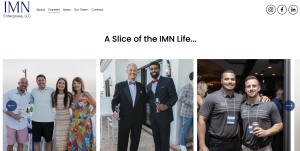If you didn’t know it, yesterday was ‘Remote Worker Appreciation Day’.
It’s a celebration day that aims to recognize both the unsung contributions of remote workers, but also act as a reminder to CHROs that these non-office based workers also need the greatest attention in order to keep them motivated, and cared for from a mental health and career health point of view.
With 25% of all US jobs now being remote to some degree, the need to keep non-office-bound workers engaged cannot be under-estimated.
But with recent accusations of ‘fauxductivity’ amongst this particular group – where disengaged, but out-of-sight workers, are pretending to busy – some experts say the need for maintaining a commitment of remote workers is even greater.
So what strategies can companies adopt to do this?
To mark Remote Worker Appreciation Day, TLNT spoke to Susan Miller, chief people officer at IMN Enterprises – a woman-owned medical staffing agency that was recently recognized with a DecisionWise Employee Engagement Top Performer Award.
The company is fully remote, but according to Miller (below), staff still feel appreciated, and motivated, and she has the engagement and retention rates to prove it.


So how’s she doing it? We thought we’d find out:
Q: You’re fully remote, but you have great retention and engagement. It seems like you’ve found the silver bullet. Tell us more!
A: “The whole recent remote working trend is obviously part of a bigger trend around employees weighing up what they want to do with their lives, and how work plays into this – or not. I think where we’re winning is around getting the hiring process right in the first place – making sure people are the right fit, but then crucially making sure people initial relationship with us is established properly, and from the start.”
Q: Can you elaborate on this last bit?
A: “In a remote business, you have to listen to what staff need. In January, we actually hired a dedicated talent & acquisition manager and a L&D manager onto our team, and we’ve totally revamped what our first two weeks with the business looks like for new joiners. This is specifically to ensure we connect with people. A big part of our onboarding is listening, and we want to show people how to behave in a remote environment. To go into this in more detail, our talent acquisition manager now has a really robust first-year check-in cycle. Not only do we do weekly check-ins for all staff, but any new-joiner has a 30-day check-in with the director of HR, and then there are 60-day and 90-day and six-month check-ins.”
Q: If you’re starting to sense that people may not be as happy as you think, or that they’re questioning their job, can these check-ins turn actually things around?
A: “We want the right people, and if we’re not the right fit for someone, we wouldn’t force it. But on the other hand, it may just be that people need some extra support and we do feel we can start to turn disengagement round. We get lots of subtle information from our check-ins, and we can remind people how they can re-engage with colleagues, or get involved in things they might have not known about. By getting this right, we feel we create a philosophy that translates into a workforce that values each employee’s contribution to helping deliver the best possible medical care to patients.”
Q: Is your approach particularly important if people have never worked remotely before?
A: “Absolutely. If people have joined us, and they’ve only previously worked in an office environment, then we take extra steps to ensure people feel connected. We feel it’s important that we do local meet-ups. We encourage people to meet up and get out of their houses, and we organize club trips for star performers. We also have internal coffee groups, Slack channel groups – you name it. We recently relocated our HQ to Dallas from Portland specifically to make it easier for our employees to meet for company-wide and have small group meetings and training. Small things can make a big difference.”
Q: Isn’t correct that because you’re remote you value in actually ‘seeing’ people – even virtually?
A: “Yes. We are what we call a ‘camera-on’ company. We insist, in all meetings, that people have their cameras on, just so we and they can see and connect with each other. We also have an awards program called the IMNPactful Person Award, which is a peer-nominated program where anyone can nominate their colleagues.”
Q: The big question: what contribution do you think all of these policies has on engagement and retention?
A: “Retention can – of course fluctuate – and you want turnover in a healthy organization, but our attrition is currently around 10%. It was 7% in Q1 and 12% in Q2 – and that’s something we feel good about. In terms of engagement, our annual survey looks at this, and specifically whether people like to work remote. Our latest results show quite categorically that this is their preferred option – with 100% of staff saying they want to remain remote.”
Q: Essentially, does someone have to be comfortable being remote if thwy want to work with you (I would guess so!)
A: “As a remote business, yes! This is definitely a business where people have to be comfortable working remotely. If someone applies to us who hasn’t exclusively worked remote before, we wouldn’t discriminate against them, but we would look hard to determine whether or not they are self-starters. We’ve hired people who have both experience being remote and experience not being remote, and because we hire for fit, we’ve been very happy with both. In our engagement survey we get some of our highest scores for questions like: I understand how my work contributes to the overall success of IMN’; ‘I feel as productive working from home as I do working in the office’; ‘My direct supervisor communicates important information to the team’; and ‘My work is valued by IMN.’”
